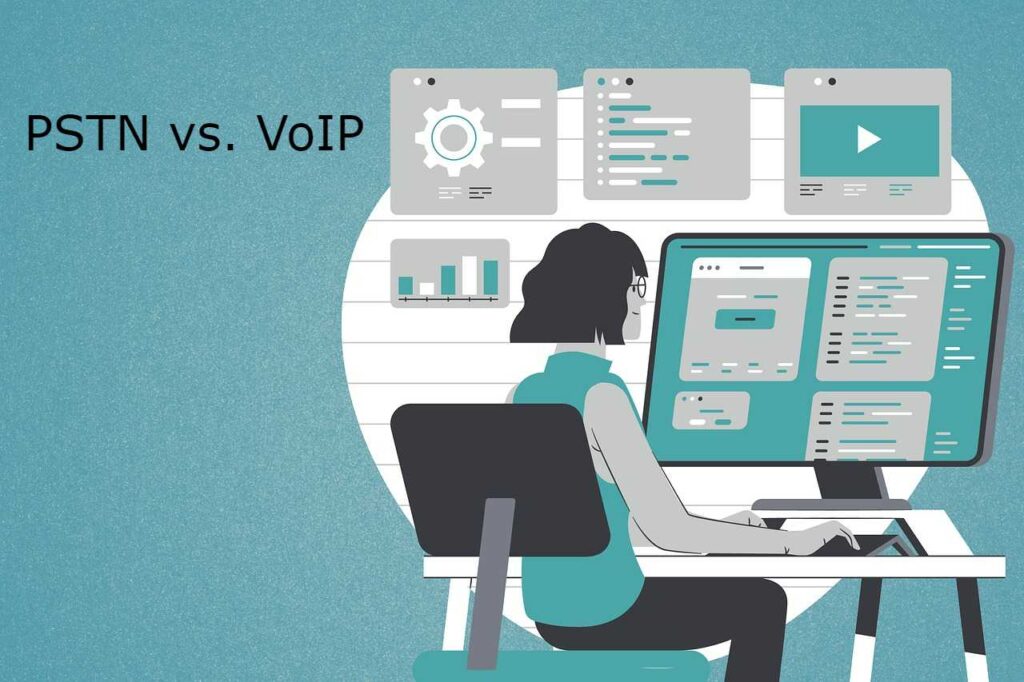
In this PSTN vs VOIP discussion, we need to know what they really are. VoIP (Voice over Internet Protocol) and PSTN (Public Switched Telephone Network) are two different technologies that are used to transmit phone calls. VoIP uses the internet to transmit calls, while PSTN uses traditional telephone lines. Both systems have their own benefits and drawbacks, so it’s important to consider which one is the best fit for your needs.
Some benefits of VoIP include:
- Lower cost: VoIP calls are often much cheaper than PSTN calls, especially for long distance or international calls.
- Flexibility: VoIP can be used on a wide variety of devices, including smartphones, tablets, and computers, making it easy to stay connected wherever you go.
- Advanced features: VoIP systems often come with a wide range of advanced features, such as voicemail, call forwarding, and conference calling, which can be useful for businesses.
Some benefits of PSTN include:
- Reliability: PSTN networks are generally very reliable and are not prone to the same kinds of disruptions that can affect internet connections.
- Compatibility: PSTN systems are compatible with traditional telephone equipment, so you can use your existing phone lines and phones with a PSTN system.
- Emergency services: PSTN systems are directly connected to emergency services, so you can easily call for help in an emergency.
In conclusion, whether VoIP or PSTN is the better option for you will depend on your specific needs and circumstances. If you want a cost-effective and feature-rich system that can be used on a variety of devices, VoIP might be the better option in this VOIP vs PSTN discussion.
Why was the PSTN Declining?
The PSTN (Public Switched Telephone Network) has been declining in recent years due to the increasing popularity of VoIP (Voice over Internet Protocol) and other internet-based communication technologies. VoIP allows users to make phone calls using the internet rather than traditional telephone lines, and it offers a number of benefits that have contributed to the decline of PSTN.
In this PSTN vs VoIP discussion, VOIP calls are often much cheaper than PSTN calls, especially for long distance or international calls. This has made VoIP an attractive option for both businesses and individuals. VoIP can be used on a wide variety of devices, including smartphones, tablets, and computers, making it easy to stay connected wherever you go.
Also, VoIP systems often come with a wide range of advanced features, such as voicemail, call forwarding, and conference calling, which can be useful for businesses.
PSTN vs VOIP discussion includes also the fact that VoIP uses digital signals to transmit calls, which allows for more efficient use of network resources. This means that VoIP networks can handle a larger number of calls with the same amount of infrastructure.
Overall, the decline of PSTN can be attributed to the increasing popularity of VoIP and other internet-based communication technologies, which offer a number of benefits over traditional telephone systems.
Advantages of a Business VoIP Phone System
A business VoIP (Voice over Internet Protocol) phone system is a phone system that uses the internet to transmit calls. It offers a number of advantages over traditional phone systems, including:
Scalability & Mobility
VoIP systems are easy to scale up or down as the needs of your business change. Also, VoIP can be used on a wide variety of devices, including smartphones, tablets, and computers, making it easy to stay connected wherever you go.
Integration Into Other Systems
VoIP systems can easily be integrated with other business systems, such as customer relationship management (CRM) and enterprise resource planning (ERP) software.
Cost
Business VoIP systems are often much cheaper to operate than traditional phone systems, especially for long distance or international calls.
Real-Time Audio & Video Call & Conferencing For More Efficient Contact
VoIP Phone System provides many features such as calls, conferences, messages, cloud storage, real-time interactions. The conference function is a huge advantage for multinational companies because they save time and money to organize meetings. VoIP systems make it easy for employees to work remotely, as they can use their VoIP phone from any location with an internet connection.
Other System Benefits
VoIP systems often come with a wide range of advanced features, such as voicemail, call forwarding, and conference calling, which can be useful for businesses. Overall, a business VoIP phone system can offer significant cost savings and increased flexibility and productivity for businesses of all sizes.
